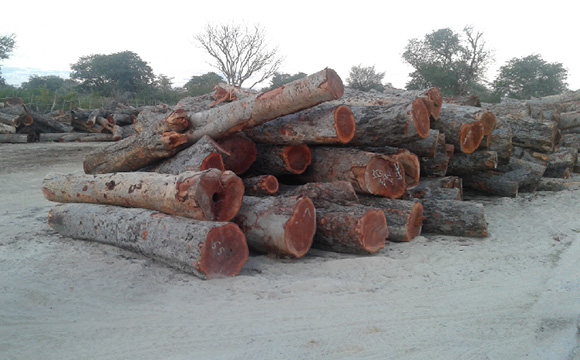By Shinovene Immanuel | 03 August 2018
A CHINESE company wants to cut down 1 000 trees in the Zambezi region in exchange for the building of traditional authority offices and a school hostel block.
A draft report compiled by an environmental consultant, Nyepez Consultancy CC, to determine the impact of the proposed timber harvesting in the Liselo area, shows that the Chinese company, New Force Logistic CC, has partnered the Mafwe Traditional Authority on the project.
Nyepez Consultancy CC was hired by New Force Logistic CC, which wants to cut 1 000 trees from a 500-hectare plot that is a portion of the 10 000 hectares reserved for the proposed tobacco plantation.
New Force Logistic CC was in trouble in February this year when the Anti-Corruption bust it for allegedly being involved in illegally cutting trees from a forest in the Zambezi region.
That same company, in partnership with the Mafwe Traditional Authority, wants to chop down trees, export the timber to China, and use some of the money to build the Mafwe Traditional Authority office headquarters.
The value of the trees to be cut and exported and the value of the traditional authority offices and hostel block could not be established.
“The objective for cutting the trees is to transport and export the raw material timber to China so that the profits to be gain[ed] will be used to support and develop the Mafwe Traditional Authority office headquarters at Chinchimani,” the report stated.
The other objective of chopping down the forest, according to the report, is for the Mafwe Traditional Authority to assist the government by constructing a hostel block at the Simataa Senior Secondary School.
“This came as a result of the financial challenges or crises the government is undergoing for lack of financial support. The process of harvesting timber will create casual contractual employment for the residents of Liselo and the Zambezi region,” the report said.
The report continued that New Force Logistic CC employs about 50 temporary workers, including 35 timber harvesters.
An environmental assessment report usually contains the comments from the public, who add their opinion about the proposed project.
The report includes comments from Auriol Ashby, a development consultant, who said the proposed tobacco plantation and timber logging area in the area is declared as state forest land in the Zambezi Integrated Regional Land Use Plan (Irlup).
The plan, he said, was developed in 2015 with participation from communities.
Ashby said the plan stated that the land use plan does not support the locality of the proposed Oriental Tobacco Farm in the state forest.
“The state forest is reserved for the protection of natural resources, and the clearing of 10 000 hectares of land will be against this principle. The state forest is also an important wildlife corridor, and any such large project will have an impact on wildlife movements,” Ashby quoted from that plan.
The companies which want to grow tobacco in the Zambezi, claim it will also grow crops alongside tobacco on the plantation.
Zambezi governor Lawrence Sampofu has pushed for the tobacco plantation because it has the component of food production.
The public is, however, concerned that the harvesting of trees would harm one of Namibia’s protected forests.
In fact, the report shows that there was a person at the public meeting who questioned whether the company is using the food production aspect as a smokescreen to push for the timber project.
Another concern was that the Zambezi region’s forest is a limited resource in Namibia.
“It is a national issue, and should be considered and consulted upon nationally, and not at a local scale. A public meeting in the region is not adequate for a project of this magnitude,” the report quoted a concerned person as saying.
Another comment includes questions about the total investment of the project, where the money will come from, and whether it is already available.
The public also asked how the project would affect the wildlife in the area.
“And what measures are to be put in place to prevent human-wildlife conflict? Often a time, we hear of conflict between farmers and wildlife in the region. Are we sure we are not intensifying agricultural production in what is supposed to be wildlife protected zones?” an unidentified person said in the report.
The same person also said the Zambezi is home to Namibia’s most pristine forests.
“How will the project compensate for biodiversity loss?” the person asked further.
The company tasked with investigating the impact of the proposed timber harvesting project in the area concluded that the project could go ahead.
“This environmental scoping report has addressed the key issues as identified, and no significant impacts have been identified,” Nyepez Consultancy CC concluded.
The company, however, admitted that there is a lack of long-term data on the impact of repeated logging.
“While production forests should not be viewed as substitute for unlogged, old-growth forest, the value of a well-managed logged forest as a complement to strictly protected areas should not be ignored, particularly in regions where the conservation of extensive areas of pristine habitat is no longer possible, or is economically or socially unfeasible,” Nyepez Consultancy added.
Efforts to get comment from the Mafwe Traditional Authority were not successful.
The Namibian reported last year that senior Mafwe Traditional Authority adviser Elias Mueze said anyone who is against the export of timber from the Zambezi region should mind their own business.
– shinovene@namibian.com.na






